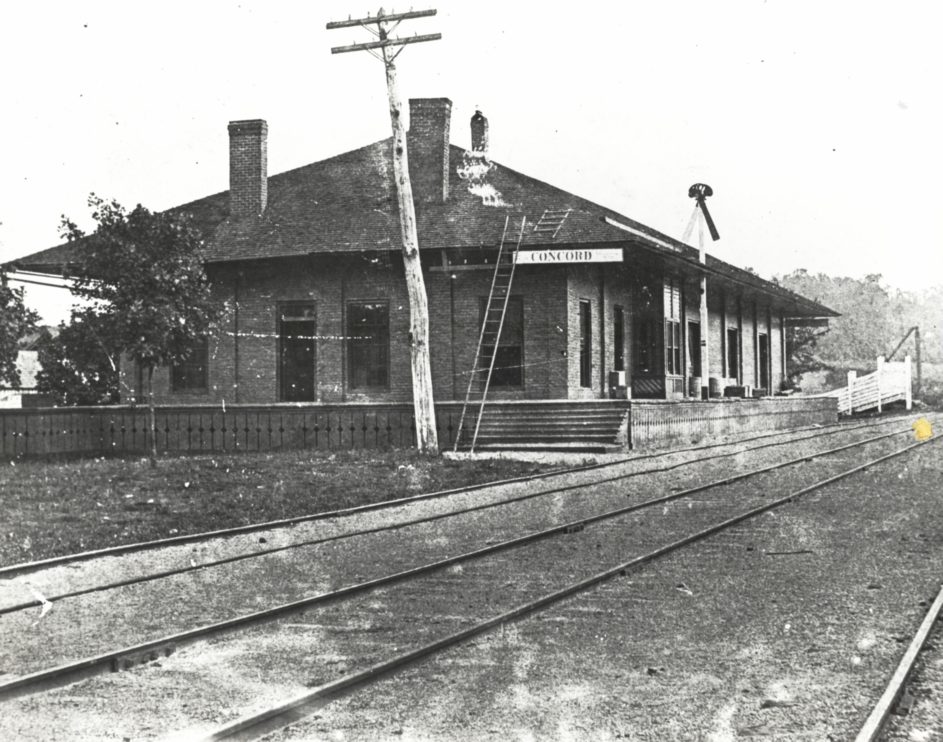It is early 1950s and the reliable Southern locomotive rolls past houses, farms and fields on its steel path toward Concord, Tennessee. As the mighty engine reaches the depot, it slows down and the engineer gives a low toot of the whistle – a signal that residents knew meant 3:20 p.m. Generally, the engine would slow to a crawl just long enough to reach out and grab the sack of outgoing mail that is hanging from a metal arm at the Concord depot and another sack of incoming mail is kicked to the outside of the rails. Other times, the big engine would idle while freight is unloaded.
Thurston Raper, a local workhand, picks up the huge sacks and takes them across the road to the Concord Post Office. Mr. Raper was always available for any odd chores they might need done and he dug with great precision 90 percent of the graves in Concord Masonic Cemetery.
As the sounds of the afternoon locomotive carried across Ft. Loudon Lake, local fishermen knew it was time to gather at Hobbs’s Grocery. There, they would take their places on the liars’ bench outside of the store, whittle and tell of the ones that got away. As many a checker match ensued, they dined on either a can of sardines and crackers or one of Miss Lena Hobbs’s bologna and watercress sandwiches, all washed down with a Coca-Cola in a bottle.
The town of Concord was enjoying the success of the post-war economy. The steam locomotive had given way to a diesel locomotive and passengers were still traveling by rail. With the railway and depot that contained a teletype, Concord was never far from the news of the day and letters from relatives and loved ones.
Delivering the mail had been seriously upgraded from times when mail was carried by horseback from the Campbell Station blockhouse which was defended by gun ports built into the walls. Government archives tell of a petition by Samuel Martin of Campbell’s Station, Tennessee, in 1831 which petitioned that all newspapers and pamphlets, not exceeding one sheet should pass free in the mail and to do away with the two cents allowed to postmaster for delivering each free letter. Mr. Martin opined that as the national debt was paid off, the whole post office establishment should be supported by the general funds of the nation.

Mollie Isbell, 1918-1964
This author has many memories of the sights and smells of the old Concord post office as her mother, Mollie Isbell, worked as postal employee at the window to assist the public. On occasion, the incoming mail sack might be run over by the train or spilled onto the track where Mr. Raper and yours truly would be tasked to pick up the severed pieces and attempt to tape the jig-sawed mail so that it could be delivered in one piece.
Some days were heavy work days as farmers’ mail orders of baby peeps were strapped to the rural carriers’ car hoods or Sears Roebuck catalogs were hefted for delivery.
Postal regulations required that all customers complete the paperwork necessary for mail orders which sometimes created a problem as not all of Concord’s customers were literate. That is when my mother would clock out, walk through the door to the front lobby, assist the customer with their paperwork, return to the mailroom, clock in and then wait on the same customer!
Living with Miss Mollie had advantages when it came to addressing Christmas cards. While sitting at the kitchen table, one would simply call out a name and she would reply “One,” “Two” or “Three” indicating the addressee’s route number. Today, she would be a walking Google or telephone directory.
No one then could have predicted house numbers, zip codes, Amazon or social media. The phrase “Passengers will please refrain” dwindled as passenger service discontinued around 1968. Thus, today only freight trains speed thru the little community which is now “Olde Concord.” And Mr. Martin would be interested to know that the largest-ever increase in the price of a first-class stamp occurred on Sunday, Jan. 27, 2019, by five cents to a price of 55 cents. The increase was legally challenged as being excessive – and the courts agreed to maintaining the price through 2020.
And now, in more complex times, the small community of Concord still remains never far from the news of the day and letters from relatives and loved ones.

Concord Post Office (from writer’s collection)

Hobbs Store (from writer’s collection)

